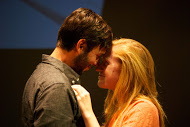The Birthing of a New Opera
Any premiere is like a childbirth of sorts. The proud parents (in this case the composer, librettist, producer, musicians and technical staff) preside expectantly while the new baby makes its way out into the world, and, when it does, the crowd goes wild: A Child (or in this case, a chamber opera) Is Born!
Noon At Dusk is the delectable new baby of composer Stephen Lewis and librettist Yi Hong Sim, presented by Kallisti under the artistic direction of UC San Diego Professor Susan Narucki. The opera premiered on May 11, 2016, at the Conrad Prebys Music Center Experimental Theater and will be repeated on May 13 and 14. It is definitely worth seeing.

Noon at Dusk Photo by Jennifer Bewerse, used by permission of UCSD Music
My sassy, snarky self might add a subtitle to Noon At Dusk–something along the lines of #FirstWorldProblems. The subject matter concerns the kinds of issues that many upper middle class graduates of major universities face during their lives and professional careers. The overwrought sense of angst and trepidation for life’s persistently difficult problems leaves an old fish like me thinking, “Don’t worry kids, you’ll work it out.”
I guess that problems like putting one’s professional career in front of one’s personal life or “Is she the one for me?” just do not shake my world. Police brutality, “where goeth the republic?”, Syrian refugees, who gets to use which restroom, or any number of other truly life-threatening global situations do. Noon’s libretto could pass for an update of Stephen Sondheim’s Company. I half expected a Greek chorus to pop out of the wings and encourage Bobby to keep trying to solve his deepest, existential questions (such as which woman to date next). I guess the conflicts in this opera are germane for some and essential to the librettist and folks of a certain age, but this flaccid effort failed to get me all upset about them.
Which is not to say that the 90-minute opera was not an enjoyable experience, because it was! Lewis’s score is an elegant, slow moving exposition of the subconscious thoughts and inner arguments of the six cast members. He writes in a style reminiscent of early Luciano Berio, but Luigi Nono even more so. Yet it is hard, even after 90 years, not to draw a direct line back to Alban Berg’s Wozzeck. Consistent issues such as alienation, the abuse of the less privileged, and egocentric self-prepossession poke their heads up in both operas.
Lewis’s ultra-constructivist style was like observing cumulus sound clouds slowly drifting by. This constantly shifting sonic world proved fascinating and effective, brilliantly played by a crack team of thirteen musicians ably conducted by Dana Sadava. The impressive band, made up of local free lancers and UC San Diego graduate students, possessed the expertise in the advanced musical language and extended techniques that the Lewis score demanded.

Jonathan Nussman and Hillary Young, photo by Jessica C. Flores; used by permission of UCSD Music
The leads sang with a sound and control of the composer’s difficult musical lines that one might expect from totally mature new music specialists. In the role of Annelise, Ashley Cutright was especially compelling with her huge, rafter shaking sound. Kirsten Ashley Wiest as Daniela was a paragon of pitch – spot on. The two impressive male vocalists, Jonathan Nissan and UC San Diego Professor Philip Larson, finished each others sentences and thoughts when they were not singing directly in unison. Each captured his own personal battles perfectly through song.
The extremely effective minimalist production and the slow moving video projection of the chief characters during their individual arias gave us an unexpected pathway into their tortured subconscious.
This was a fully professional production in the best sense of the word. If it was ever to be characterized as a “student production,” it would be so in name only. My only reservation about the production is the lack of supertitles, which made understanding the actual texts impossible, detracting from this otherwise handsome work.

Thank you for your review! For all who are curious, the full libretto is now posted online: http://www.stephenlewiscomposer.com/noon-dusk-libretto/